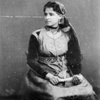Disclaimer
This entry contains information known to us from a variety of sources but may not include all the information currently available. Please be in touch if you notice any inadvertent mistakes in our presentation or have additional knowledge or sources to share. Thank you.
Archive
Synagogue at Laghouat, Algeria
An oasis in the Sahara filled with flowers and palm trees, Laghouat literally means "houses surrounding gardens." Jews came to the town centuries ago and by legend fought alongside Muslims against the French forces who conquered the city in 1852. For the next century, Jews would play a key role mediating between the city's French authorities, nomadic Muslim tribes, and the city-dwelling Muslim population [1]. In 1925, for example, Jacob Lalou - a 54-year-old Jew who was fluent in the religious traditions of Laghouat's diverse communities - was elected head of the Municipal Council. Lalou served in the position until 1947, thanks in part to the backing of heads of local Muslim nomadic tribes and Sufi orders. When the local military commander tried to strip him of his role, as per Vichy rules, local Muslim leaders intervened to preserve his position. Lalou, who owned a Quran in Hebrew and Torah in Arabic, created the city's second synagogue on the main avenue downtown, in a large home purchased from the Achouch family. The sanctuary was created within what had been the main living room. A young rabbi from the yeshiva in Ghardaya was recruited to lead the synagogue. On Passover and Shavuot, certain prayers were recited by members in Judeo-Arabic. Jacob Lalou stayed in Laghouat until early 1963 before departing for a suburb of Paris. In his will, he bequeathed funds to welfare offices in Algiers and in Laghouat, supporting with equal payments social services for Muslims, Christians, and Jews. Although the majority of Laghouat's Jewish community departed the city for Israel or France, a 1964 statement reported that the town maintained a synagogue, where "a minyan was occasionally gathered" [2].
Description
The Jewish community in Laghouat dates back to as early as the town's founding in the sixteenth century. During the French conquest of Algeria, a Jewish French officer described the town's Jewish community, stating that all the Jew's lived on one street, the men worked as "artisans and mechanics", and the women wove cloth. Although Laghouat's Jews originally opposed French occupation, in 1870 the French granted Laghouat's Jews French citizenship--an important distinction from the treatment of other Jewish communities. Laghouat's Jewish population climbed from 282 in 1905 to 443 in 1950 as Jews moved into jobs as artisans, clerks, elected officials, and accountants. However, during the Vichy regime, Laghouat was home to an internment camp to which Jews from all across Algeria were deported. By 1962, the majority of Laghouat's Jewish population had departed for Israel or France [3].
Jewish Mayor of Laghouat, Algeria
Sources
[1] Todd Shepard, "Laghouat," Encyclopedia of Jews in the Islamic World, Executive Editor Norman A. Stillman, Brill Online, 2014, Reference, Wellesley College, 19 June 2014 <http://referenceworks.brillonline.com/entries/encyclopedia-of-jews-in-the-islamic-world/laghouat-SIM_0013360>.
[2] DiarnaInfo, "Jewish Mayor of Laghouat, Algeria," Online video clip, YouTube, YouTube, 20 Sept. 2012, Web, 19 June 2014, <https://www.youtube.com/watch?v=UTH6ghn7KZI>.
[3] Todd Shepard, "Laghouat," Encyclopedia of Jews in the Islamic World, Executive Editor Norman A. Stillman, Brill Online, 2014, Reference, Wellesley College, 19 June 2014 <http://referenceworks.brillonline.com/entries/encyclopedia-of-jews-in-the-islamic-world/laghouat-SIM_0013360>.
Videos
DiarnaInfo. "Jewish Mayor of Laghouat, Algeria." Online video clip. YouTube. YouTube, 20 Sept. 2012. Web. 19 June 2014. <https://www.youtube.com/watch?v=UTH6ghn7KZI>.







